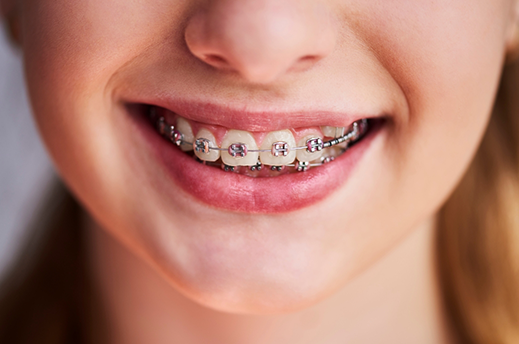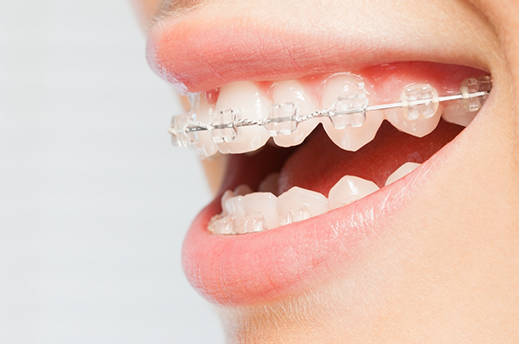Traditional Braces Bethel Park & McMurray
Tried-and-True Orthodontic Solutions for All Ages
The term “braces” was first coined in the early 1900s, and ever since then, countless patients of all ages have been relying on this time-tested system to straighten their teeth, improve their bite, and smile with more confidence than ever before. At Smiles by Palmer, patients pursue either metal braces or ceramic (tooth-colored) braces with Dr. Palmer's experienced, friendly guidance – and our dedicated team members will provide plenty of support as well! Contact either our Bethel Park orthodontic office or our McMurray location today to schedule your first consultation for traditional braces.
Why Choose Smiles by Palmer for Traditional Braces?
- Local Orthodontist with Board-Certification
- Personalized Treatments for All Patients
- Two Convenient Office Locations
Metal Braces

Metal braces are the most common type of orthodontic treatment. Today’s metal braces are smaller, more comfortable, and more attractive than ever before. They consist of metal brackets made of high-grade stainless steel that is bonded to the facial side of teeth, usually along both the upper and lower arches, as well as an arch wire. This thin arch wire is clipped into the brackets and runs along your entire arch in order to put pressure on your teeth. Elastic rings, also called O-rings or donuts, secure the arch wire to the brackets. To anchor the arch wire, bands or metal rings are usually placed around your back teeth. Together, these materials work to move your teeth up or down and side-to-side to give you a straight smile.
Clear Ceramic Braces

Ceramic braces are made of translucent material. They are most popular with adult patients and teens due to their cosmetic appeal. The only drawback to ceramic braces is that they are more fragile and a little larger than traditional metal brackets. Another consideration when you’re deciding what type of braces to wear is cost. Ceramic braces are typically more expensive than metal braces.
Learn More About Ceramic Braces
Traditional Orthodontics FAQs
What is the best age for orthodontic treatment?
At Smiles by Palmer, we provide orthodontic treatment to patients who are in their teens all the way to their 50s and 60s. So, we believe that there’s no real ideal time to get braces, just as long as you do (if you need them, of course!). As soon as you know that you suffer from crowded, gapped, or crooked teeth, or bite misalignment, it’s a good idea to look into solutions, because living with these issues can increase your risk of developing oral health problems down the road.
How long does traditional braces treatment last?
The American Association of Orthodontists conducted a survey that showed that the average amount of time that a patient has braces is about 22 months. Because each treatment timeline is unique and depends on a variety of customized factors, like the severity of the orthodontic issues you face, it’s a good idea to visit your orthodontist in Bethel Park for an initial consultation to get a better idea of how long you’d need to wear braces for. Depending on your case, it could be anywhere from six months to three years.
What foods should I avoid with braces?
With braces, you’ll need to be conscious of what you chew, because the brackets and wires aren’t indestructible. A good rule of thumb is to avoid foods that are excessively crunchy and chewy, because these could set back your treatment timeline if they accidentally damage your oral appliance. It’s also a good idea to avoid sugary foods so you don’t develop cavities while you undergo treatment.
How often will I need to visit the orthodontist during my braces treatment?
Throughout your braces treatment, you’ll need to visit your orthodontist every six to eight weeks to have them adjusted and for a quick progress check. During these appointments, we’ll make sure that you’re on track with your treatment timeline and answer any questions or concerns that you have.
Can I still play sports if I have braces?
If you’re undergoing treatment with traditional braces in Bethel Park, we’ve got good news: you can still be an active participant in your local athletic team! Our team even custom-designs special mouthguards to help protect your smile and your orthodontic appliance if you play contact sports!
